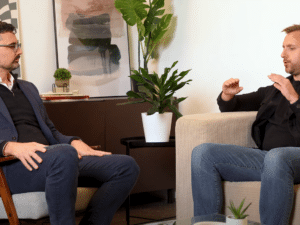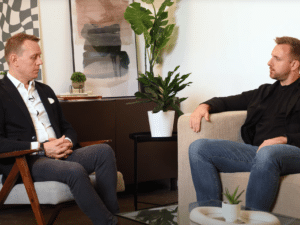View from the top – Michelle Tan at Pinebridge Investments
In our most recent edition of „View from the top“, we interview Michelle Tan, Managing Director, Global Head of Employee Development and Engagement at PineBridge Investments.

What is your advice to your peers (other HR leaders) around DEI; why is this a business imperative and how can you ensure the organization fully embraces this rather than just paying ‘lip service’ to it?
A company’s long-term commitment to DEI has impact across an entire organization, from culture and engagement to productivity and innovation. Looking at DEI through a long-term lens is important because these are not one or two year initiatives. What really moves the needle is the authentic commitment by senior leadership to champion DEI efforts. This top-down sponsorship conveys credibility and encourages employees to both lead and support DEI initiatives. In addition to senior leader sponsorship and firmwide commitment, companies need to form DEI committees and workstreams that are responsible for setting goals, evaluating progress through, internal metrics, external benchmarks, and rewarding desired behaviors.
In addition, DEI efforts need to be embedded into a company’s policies, programs, performance management and training programs across the employee lifecycle from recruiting, onboarding, developing, promoting, engaging, and compensating employees. An important component of a DEI infrastructure is maintaining a two-way communication pathway with employees. Partner with your employee resource groups, conduct listening tours to learn more about their lived experience and how the company can improve its approach to DEI. This communication pathway can enhance the company’s cultural competence and serve as key inputs to their DEI strategic action plans.
What would be your advice to other HR leaders around the use of technology within the function and the wider business?
I am a strong supporter of HR utilizing technology to deliver their business objectives with quality and efficiency. Technology can decrease the amount of time our HR professionals spend performing manual tasks and increase the time for human-centered interactions such as strategically consulting with business leaders and intentionally interacting with employees.
I encourage HR leaders to have a thoughtful approach when deciding which technologies they should invest in. Take a holistic view of your organization’s business needs, capabilities and resources. Consider the human capital required to install and maintain them; without dedicated resources, organizations may not fully realize the technology’s intended benefits. Some questions HR leaders and their teams should explore are: How will the technology help you achieve your business goals? How much time will it take to implement and maintain? Will it support scale and efficiency? How will the technologies interact with each other? Finally, I encourage HR leaders to conduct their due diligence when selecting their technology partner. It is essential to have a thorough understanding of the technology’s capabilities, limitations and how they will support your business requirements to prevent unnecessary workarounds or end-user disappointment. HR leaders should also speak with other companies utilizing the technology to get a direct account of their end-user experience from installation to maintenance and customer service.
Do you think HR is viewed as an attractive career option and what do you consider its key selling points?
Although I’ve seen attention given to human capital topics such as employee engagement and leadership, there is still work to be done for showcasing HR as a career option. As a profession, we need to galvanize our resources and explain our profession’s value proposition beyond the more commonly known functions such as recruitment, payroll, and benefits. Today’s HR department is a strategic business partner that has representation at the C-Suite and helps organizations achieve their business goals through human capital. Furthermore, we need to highlight the broad range of HR career options such as professional development, talent management, analytics, and employee engagement.
I am optimistic that we will see more HR executives featured on top-tier business news shows explaining the competitive advantage their human capital strategies have in their industry. When this happens, it will elevate the HR brand and encourage prospective professionals to consider HR as a career option.
What do you believe to be the key factors influencing current candidates when they are applying for jobs and have you developed specific strategies to attract millennials/what do these involve?
Many of our prospective candidates want to learn more about professional development opportunities, career growth, DEI efforts, culture, and hybrid/ flexible work arrangements. They often ask follow-up questions from information posted on our corporate website. They are looking for an environment that will give them meaningful work that has impact, have opportunities to share their opinions, grow their careers and have a healthy work-life balance.
We want all our candidates to have a positive experience when interviewing at PineBridge. We appreciate the impact an interview has on the candidate’s early impression of our firm, and we want it to be a positive one that represents our inclusive culture. We encourage candidates to ask questions so that they can make an informed decision if PineBridge would meet their professional needs and personal preferences.
Our firm has a comprehensive interview process that embeds DEI best practices. We seek to attract a diverse candidate pool through our job descriptions that are written with inclusive language. Furthermore, hiring managers and interview panel members have access to interview training and resources that focuses on competency-based interviews, objective evaluation criteria and selecting candidates that are culture add versus culture fit. I encourage companies to continuously evaluate their talent acquisition strategies and collect candidate and interview panel feedback to influence process improvements.
What is your advice to your peers (other heads of employee development and engagement) – how can they ensure they have a robust talent pipeline coming into the business when demand and supply of skills is in constant flux?
I strongly encourage HR leaders to have a robust talent management process that includes internal and external factors. Having a real-time pulse on the internal and external environment will enable your company to be agile to meet your company’s human capital needs. HR leaders should consult with their senior leaders on an ongoing basis and have formal biannual talent reviews. From an internal perspective, HR should evaluate their human capital metrics, including tenure, time to promotion, succession planning, diversity metrics, turnover and future headcount needs. Future headcount should be evaluated beyond skill sets and capabilities and should include work environment flexibility. Post Covid, talent has moved to a variety of geographic locations. Candidates are seeking employers that offer work-life balance and flexible work locations. Highlighting your company’s approach to work-life balance and flexible work models such as hybrid and fully remote opportunities can give you access to a broader talent pool and a competitive advantage in winning talent. HR leaders can have a dual focus that balances giving employees flexibility in their work environment while meeting the needs of the business.
From an external perspective, you should utilize platforms such as LinkedIn Recruiter to evaluate the potential talent available across locations. HR should build and maintain relationships with recruiting agencies, colleges, and universities. Finally, I encourage HR leaders to have internship programs that can develop talent within their communities and build a strong talent pipeline for the future.
Please note that all commentary and opinions provided are those of the individual, and not the organization/company.



